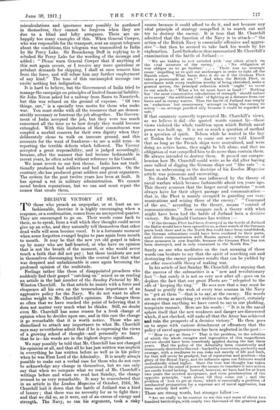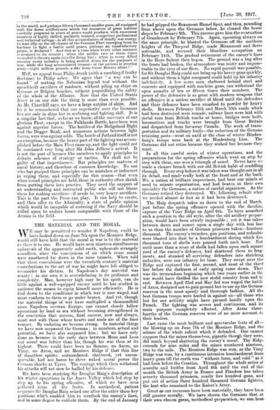DECISIVE VICTORY AT SEA.
TO those who preach an unpopular, or at least an un- fashionable, doctrine it is highly encouraging when a response, or a confirmation, comes from an unexpected quarter. They are encouraged to go on. Their words come back to them, so to speak, from a wall which they thought could never give up an echo, and they naturally tell themselves that other dead walls will soon become vocal. It is a fortunate moment when some forgotten evangel begins to pass again from mouth to mouth. It may be that the new yet old gospel is taken up by many who are hall-hearted, or who have no opinion that is not the breath of the moment, or who would never touch a faith that did not pay ; but those incidents are not in themselves discouraging beside the central fact that what was despised and unfashionable is once again becoming the professed opinion of the multitude. Feelings rather like those of disappointed preachers who suddenly find their gospel " catching on " seized us on reading an article in the last number of the Sunday Pictorial by Mr. Winston Churchill. In that article he insists with a force and eloquence all his own on the tremendous importance of an aggressive policy for the Navy. We do not want to allow undue weight to Mr. Churchill's opinions. He changes them so often that we have reached the point of believing that it does not matter very much what he thinks. Still, no doubt even Mr. Churchill has some reason for a fresh change of opinion when he decides upon one, and in this case the change is go remarkable that it is worth notice. Those who are disinclined to attach any importance to what Mr. Churchill says may nevertheless admit that if he is expressing the views of a growing school of thought—and personally we fancy that he is—his words arc in the highest degree significant.
We may possibly be told that Mr. Churchill has not changed his opinions at all, and that all he has just written was implicit in everything he has written before as well as in his policy when he was First Lord of the Admiralty. It is nearly always possible to make out a verbal case for those who do not care to acknowledge any change in themselves, but we can only say that when we compare what we read of Mr. Churchill's writings before and what we read last Sunday, the change seemed to us very remarkable. It may be remembered that in an article in the London Magazine of October, 1916, Mr. Churchill laid it down that the battle of Jutland was a kind of luxury ; that there was no necessity for us to fight then ; and that we did so, as it were, out of an excess of energy and strength, The Navy, so ran his argument, took a risky course because it could afford to do it, and not because any vital principle of strategy compelled it to search out and try to destroy the enemy. It is true that Mr. Churchill admitted that the function of the Navy is to attack—" the action of the British Navy is essentially offensive and aggres- sive "—but then he seemed to take back his words by his explanation. Lord. Sydenham thus summarized Mr. Churchill's examination of the battle of Jutland :- " We are bidden to ro3t satisfied with ` our silent attack on tho vital interests of the enemy.' . . . 6 No obligation of war obliges us to go further.' . . . ' There was no strategic cause' impelling us to quit our anchorages in order to fight off the Danish coast. What harm does it do us if the German Fleet takes a promenade at sea ? ' And when the British Fleet, in accordance with every tradition worthy of being cherished, seeks a general action, the principal reflection which ' ought ' to occur to our minds is : What a lot we must have in hand ! ' Nothing
but the most conservative calculations of strength' should induce us to accept the additional risks ' of fighting at a distance from our bases and in enemy waters. Thus the battle of Jutland was simply an audacious' but unnecessary attempt to bring the enemy to action '—an attempt justified only because it could be regarded as safe."
If that summary correctly represented Mr. Churchill's views, as we believe it did—the quoted words cannot lie—those views violated the whole tradition upon which British naval power was built up. It is not so much a question of method as a question of spirit. Nelson while he waited in the bay at Toulon for the enemy to come out never told himself that so long as the French ships were neutralized, and were doing no active harm, they might be left alone, and that no obligation of war compelled him to do more than contain them. He always intended to destroy them. It passed our compre- hension how Mr. Churchill could write as he did after having once talked of digging the German ships out " like rats "—a boast as unbecoming as the doctrine of his London Magazine article was poisonous and enervating. No doubt Mr. Churchill was influenced by the theory of naval warfare which became fashionable about ten years ago. This theory assumes that the larger naval operations " must always have for their object passage and communication— that is, the Fleet is mainly occupied in guarding our com- munications and seizing those of the enemy." Command of the sea," according to the theory, means " control of communications." Now compare such a theory with what might have been had the battle of Jutland been a decisive victory. Sir Reginald Custance has written :- " If the German Fleet had been destroyed in time battle of Jutland the Baltic would have been opened to us, a close watch of the German ports both there and in the North Sea could have been established, the Gorman submarines could have been confined to their ports, and direct communication with Russia opened ; whereas none of these measures is now feasible, because the Gorman Fleet has not been destroyed, and is only contained in the North Sea."
Surely no one who meditates on the vast meaning of those words can hesitate to say that the spirit of searching out and destroying the enemy promises results that can be yielded by no other conceivable theory of making war.
In his article of last Sunday Mr. Churchill, after arguing that the success of the submarines is a "new and revolutionary fact "—but surely it is not so very new after all—goes on to deplore the fact that our great Fleets are " relegated to the role of keeping the ring.' " He sees now that a way must be found to gratify the wish of every true seaman in the Navy to " get at them "—that is to say, at the enemy. His words are as strong as anything yet written on the subject, certainly stronger than anything we have cared to say in our plodding, temperate manner. Here are his words : " It is in the naval sphere itself that the new weakness and danger are discovered which, if not checked, will undo all that the Army has achieved and ruin the prospects of a decisive victory." He then goes on to argue with curious detachment or effrontery that the policy of naval aggressiveness has been neglected in the past :- " How to get at them ? ' That is the problem, to the solution of which the whole energies and ingenuities of this magnificent service should have been ceaselessly applied during the last three years. Had the policy of the Admiralty been consistently and strenuously directed to this end—backed by conviction, authority and courage, with a readiness to run risks not merely of life and limb, for that will never be grudged, but of reputation and position—the glory of the Royal Navy, and its influence upon our fortunes would undoubtedly stand higher. Once the true war thought has taken possession of the mind of power the means to translate it into action are rarely found lacking. Instead, however, we have had for at least two years the avowed acceptance, and even proclamation of the opposite principle, wait about till thoy come out' ; and the problem of ' how to get at them,' which is essentially a problem of mechanical preparation for a supreme act of naval aggression, has been entirely laid aside."
Those are strong words, but stronger follow :— "Are we really to be content to see this vast mass of about two hundred battleships, with nearly two thousand of the greatest guns in the world, and perhaps fifteen thousand smaller guns, all equipped with the finest artillerymen which the resources of great nations carefully prepared in years of peace could produce, with enormous _numbers of highly skilled., patiently trained, competent professional and technical ratings—is all this accumulation of deadly war energy to wait idly on the off-chance of the German Fleet emerging from its harbour to fight a battle until peace, perhaps an unsatisfactory peace, is declared ? And this at a time when every other resource is strained to its utmost ; when the soldier two or three times wounded is thrown again into the firing line ; when in every Allied .country every industry is being melted down for the purposes of war, while the long accumulated treasure of the nations is pouring away—eight million pounds a day from Great Britain alone !"
Well, we appeal from Philip drunk (with a numbing if frothy doctrine) to Philip sober. We agree that " a way can be sound " of making the Nelsonian legend real without the spendthrift sacrifices of madmen, without piling up ships on German or Belgian beaches, without jeopardizing the safety of the whole of the Alliance. Now that the United States Navy is on our side the thing is more than ever possible. As Mr. Churchill says, we have a large surplus of ships. And let. it be remembered that our superiority over the Germans lies not only in ships but in seafaring and fighting skill. It is a singular fact that, so far as we know, all the successes of our glorious Fleet, except in the Falklands Battle, have been won against superior forces. The battles of the Heligoland Bight and the Dogger Bank, and numerous actions between light forces, were won against. odds. The battle of Jutland itself is not an exception, because the heavy part of the fighting was accom- plished before the Main Fleet came up, and the fight could not be continued very long after Sir John Jellicoe's arrival. It is not the part of laymen like ourselves to apply principles to definite schemes of strategy or tactics. We shall not be guilty of that impertinence. But principles are matters of naval history, and therefore of common knowledge. No one who has grasped those principles can be mistaken or indiscreet in urging them, and especially for this reason—that even when sound principles are held, those in authority often shrink from putting them into practice. They need the support of an understanding and instructed public who will not blame them for making sacrifices—if needs be, very heavy sacrifices. This is the part the Press can play. It can help to create, and then offer to the Admiralty, a state of public opinion which would be incapable of cowering if the Navy should be called upon to endure losses comparable with those of the Armies in the field.



































 Previous page
Previous page